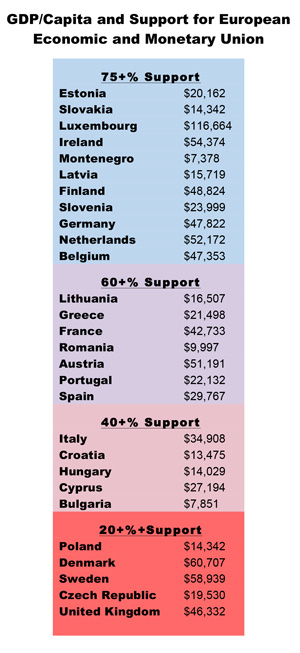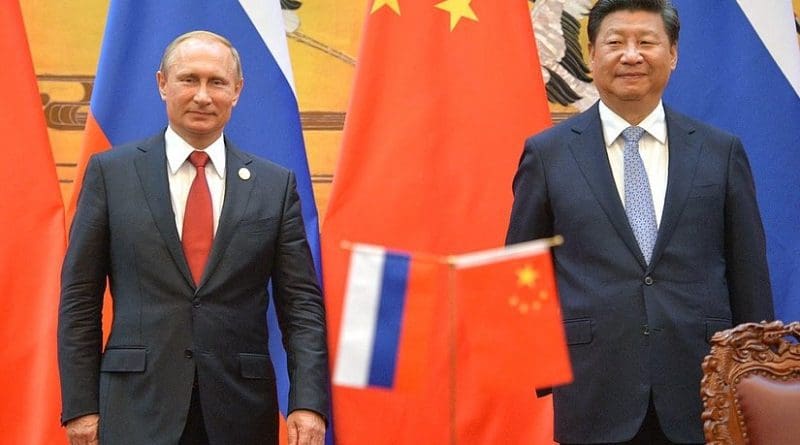China, Russia Seek To Profit As EU Beacon Of Democracy Goes Dim – Analysis
The EU – divided over debt, entitlements and refugees – confronts authoritarian politics at home and from afar.
By Humphrey Hawksley*
Not long ago the European Union stood as an unassailable beacon, a model for how trade and shared values could override historical hatreds and how a disparate collection of nations could work together under a single set of political values. After the Cold War, the EU earned its spurs by welcoming much of former Soviet-controlled Europe into its fold and mentoring governments towards delivering security, wealth and fairness. It was a triumph of globalization on European scale.
Now, partly of its own making and partly because of events out of its control, the EU has become vulnerable, in the process raising questions about viability of globalization. Vacuums created by weakness are being filled by China and Russia, powers with much influence, but driving global politics towards authoritarianism.
As yet, there are no red lines to prompt major policy decisions.
At first glance, who would care that the China Shipping Group has set up operations in the tiny half-built Moldovan river port of Giurgiulești, creating a lifeline for Europe’s poorest country or that Beijing wooed troubled Ukraine, signing deals for it to supply 75 percent of China’s imported corn. Dig deeper, and European anti-trust regulators are checking how Russia sells nuclear reactors and energy supplies to Hungary, Bulgaria and other countries.
Chinese and Russian influence in Eastern and Central Europe is no sophisticated Trojan horse, but more a natural evolution in the years since 1989, a reminder that liberal democracy is not an end point and politics never stand still.
After the Tiananmen Square protests, China launched its economy-led doctrine while the former Soviet satellite states hailed the EU’s democracy. Much of Europe experienced a peaceful transition. Russia’s own democratic experiment failed, due to corruption and sabotage to the constitution, casting it outside the European family while China’s wealth-based policies accomplished more than anyone had anticipated.
Together, branded in an authoritarian wrapper, the two nations present to many a credible alternative. Hungarian Prime Minister Viktor Orban has declared that he looks towards the Chinese model to forge a “different, special, national approach” to government and also cites Singapore, Turkey, India and Russia as stars to follow. He argues that political liberalism has failed – despite Hungary being an EU member.
Beijing runs its activities through the prism of business. It has created a special trading group, 16+1, with 16 Eastern and Central European governments and a $500 million investment fund. Accepting that this region is in Moscow’s sphere of influence, China treads carefully not to upset the wider Sino-Russian relationship.
Moscow, historically entwined with Eastern and Central Europe, offers vast energy resources and support for political movements. Out of 14 far-right parties in the European Parliament, eight support Russia, four are open to persuasion and two have spoken out against Russian influence, according to Political Capital Institute. Russia is also making inroads in EU-aspirant countries such as Serbia, Moldova and Albania.
Russia makes no secret that it wants to re-establish influence in the Soviet Union’s former arc of control. This challenge is not immediate, but needs to be acknowledged and handled before Europe gets caught unawares as it was with the refugee crisis and Russian intervention in Ukraine.
The question is how, and must European values be compromised to succeed?
The genesis of the EU was the 1951 five-nation Coal and Steel Community trading pact designed mostly to stop conflict between France and Germany. That followed a 1946 speech from Winston Churchill, between stints as British prime minister, who spoke of building a united Europe where citizens could “regain the simple joys and hopes which make life worth living.”
Until recently the European project was working well. An early marker of trouble was the 2008 economic crisis, particularly in Greece. That was followed by the Middle East and North Africa immigration flood when the EU dithered, incapable of deciding policy. The immigration crisis hit at the core of globalization. And Britain, the EU’s second biggest economy, is debating whether it should remain a member. A referendum is in June, and if Britain leaves, other nations may follow.
All of this has weakened the European vision, and again immigration and race that once seemed attenuated by globalization have become defining issues of its future.

Hungary’s Orban is a leading voice championing illiberal government, but he’s far from alone. Hungary is among the EU’s Visegrad V-4 group that also includes Poland, the Czech Republic and Slovakia, the more developed countries of Eastern Europe. Each has undergone a political swing to the right such that the European Commission is investigating Poland and Hungary for introducing anti-democratic laws that might contravene EU regulations.
Last year, Orban welcomed Russia’s Vladimir Putin, embroiled in the fallout over the Ukraine, and attacked attempts by other governments to “lock Russia out of Europe.”
This year, China’s President Xi Jinping chose to visit the Czech Republic as his only European stop on the way to the United States and with his Czech counterpart announced a strategic partnership between the two countries. Milos Zeman had already described China as having a political model that could teach much about how to “stabilize” a country – a far cry from the issue of human rights and Tibet raised by his predecessor Vaclav Havel.
High on the agenda was China’s involvement in multibillion dollar infrastructure projects. “China could provide the resources that the much troubled Western Europe can no longer afford,” said Feng Zhongping with China Institutes of Contemporary International Relations in Beijing.
The first significant contract with the Czech Republic came two years ago between Czech-Slovak J&T Financial Group and the private Chinese conglomerate CEFC, valued at $750 million. That was followed by CEFC’s investment in Travel Service Airlines with plans for a 40 percent stake.
Similar deals have been struck throughout the region. In Poland, the Pinggao Group, a subsidiary of the State Grid Corporation of China, has won contracts to build electric transmission lines; $84 million from the 16+1 investment fund is being used for wind energy projects. Chinese companies also funded Wólka Kosowska, a sprawl of shopping malls north of Warsaw. A $1.6 billion Chinese bond is due to finance a railway project between Hungary and Serbia, and the Xanga Investment and Development group won a 75-year license to operate the international airport in Hungary’s second largest city, Debrecen.
“There is more and more talk of playing the China card,” says Damian Wnukowski of the Polish Institute of International Affairs. “Given our past with the Soviet Union, dealing with China is comparatively straightforward because the primary relationship is the economy.”
The EU is aware of the Chinese or Russian influence, and for that matter, the popularity of authoritarianism, but does not yet have an overriding policy to counter it. Anti-trust measures on energy deals may not be enough.One estimate from Christoph Leitl, president of the Austrian Federal Economic Chamber, suggests that the EU must quadruple its financial assistance to balance Russia’s influence.
Some initial steps should include re-examination of EU regulations on democracy, free speech and human rights with stronger implementation if necessary. There is no mechanism to expel a member state. But more than anything, the EU needs to take on the debate and win.
In a recent rousing anti-immigration speech, Orban offered an implicit challenge to liberal democracy, accusing the EU of stealthily devouring more and more of “our national sovereignty” and adding, “The time has come to prevent the destruction of Europe, and to save the future of Europe.”
This is a direct challenge to the EU’s existence, one emboldened by friendships with Russia and China. At stake is the most successful economic and democratic experiment in modern history. The issue is too important for Europe, once again, to be taken by surprise.
*Humphrey Hawksley, a correspondent for the BBC, is the author of The Third World War (Macmillan) – a hypothetical account of a conflict between Russia, China, India and the United States.

